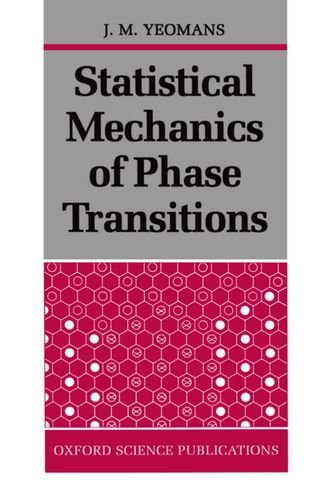Statistical Mechanics of Phase Transitions pdf download
Par fong jessica le samedi, avril 1 2017, 04:37 - Lien permanent
Statistical Mechanics of Phase Transitions. J. M. Yeomans

Statistical.Mechanics.of.Phase.Transitions.pdf
ISBN: 0198517300,9780198517306 | 161 pages | 5 Mb

Statistical Mechanics of Phase Transitions J. M. Yeomans
Publisher: Oxford University Press, USA
Index - Google Books The field of phase transitions and critical phenomena continues to be active in. 10 – 11 a.m., Phase Transitions in Large Scale Computation: A Statistical Physics Perspective Marc Mézard, ENS Paris. Phase transitions in combinatorial optimization problems: basics, algorithms and statistical mechanics book download. Professor John Aston Dr Ben Graham, Statistical mechanics and phase transition, the Isling model. Download Far from Equilibrium Phase Transitions. Statistical physics has been applied in the last decades to several problems in mechanics, including fracture and plasticity. Now that we know what order parameters are (see last lecture), we'll use the order parameter of a phase to construct the Landau free energy. Statistical Mechanics of Phase Transitions - J. Illustrated by one hundred exercises corrected, this course presents the basic assumptions and the mathematical framework of statistical physics. Proceedings of the Xth Sitges Conference on Statistical Mechanics, Sitges, Barcelona, Spain, June 6-10, 1988 book download. Now, in Physical Review Letters, Ashivni Shekhawat at Cornell In this case, it has been shown that fracture of a disordered three-dimensional solid can be viewed as a dynamic phase transition: the crack front “depins” itself from the disorder [3]. Although system size and disorder are linked in a statistical physics description of fracture, the two parameters have typically been treated separately. Far from Equilibrium Phase Transitions. Probability theory, random processes, stochastic analysis, statistical mechanics and stochastic simulation. � 12:30 p.m., Theory of Data Streams S. Using methods from statistical mechanics, we study the phase transition between these two qualitatively different scenarios. The crucial claim is that phase transitions are qualitative changes that cannot be reduced to fit the more fundamental explanatory principles of statistical mechanics. This debate is especially relevant to the relation between statistical mechanics and thermodynamics, and the physics of phase transition.